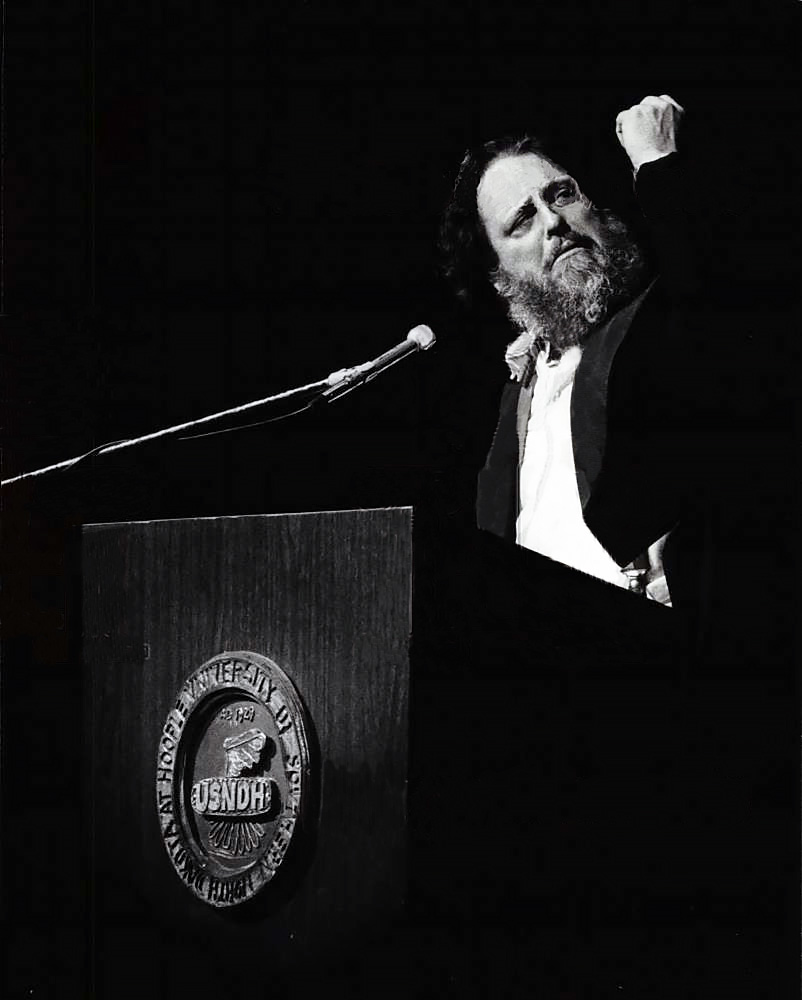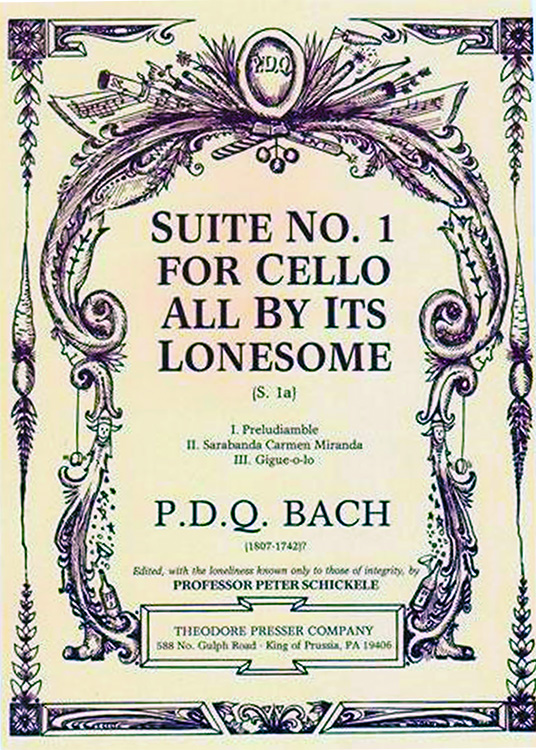Schickele Mix

"A show dedicated to the proposition that all music is created equally, or, as Duke Ellington put it, 'If it sounds good, it is good.'"
It all started at the Covid school day all-family lunch table. I had just shared a neat little story about bird art music (as opposed to art metal music). My son remarked that it sounded a little like things he had heard me play.
In truth, this observation probably was not without merit.
Then I thought back to something I heard back in my relative youth comparing highly regimented 12-tone composing to free form jazz improvisations. And, in truth again, this comparison was also not without merit. (Fun example of 12 tone and free-form). (Editing to self: is it free form, free-form, or freeform…there has got to be rule somewhere so I can be consistent in my usage.)
That comparison was presented to the listening world back in mid 1990’s on a syndicated public radio program called Schickele Mix, hosted by Peter Schickele, and, I believe, originally produced by Minnesota Public Radio for PRI.
Peter Schickele is a composer, educator, radio host, and a wonderfully humorous individual. Beyond Schickele Mix, he is probably most famous as the “discoverer” of PDQ Bach (the composer of many works including the seasonal Good King Kong Looked Out).
When he wasn’t writing fractured symphonies as PDQ, Schickele managed to get a Master’s degree from Julliard and win Grammys four years in a row. What I didn’t know until I sat down to review his bio for this paragraph was that he also wrote the score for the movie Silent Running (which was one of the inspirations for Joel Hodgson points to in the creation of Mystery Science Theater 3000 which was produced in Minneapolis which was where, I believe, Schickele Mix was recorded…it’s only a step away from being a conspiracy.)
The show itself always started with a scripted handoff. Picture in your mind’s ear, for a second, you are listing to your local public radio station (which you help to support). The station is just coming out of the top of the hour news and station ID break. Having wrapped up the teaser for whatever is coming on later tonight, the announcer introduces the next program as Schickele Mix then says something along the lines of, “Are you ready Professor?” and Schickele’s voice would answer back something along the lines of “I’ve never been more ready…let’s begin.” It was a nice segue technique for a syndicated show. As I recall, some of the call and responses could be rather unexpected. In any case. over the course of an hour Prof. Schickele would then take a quick dive into some aspect of music. The final sigh off for the show at the end of the hour, was an invitation to send a self-addressed stamped envelope to Minnesota Public Radio to get a printed playlist of that episode’s music (a similar invitation was made at the end of Fiona Ritchie’s Thistle and Shamrock).
(Again…this was pre-widespread internet.)
The program ran for 169 shows through most of the 1990s. After the show had ceased original production, public radio stations continued to play reruns until 2007 (the cool local station to show hand off sometimes became a bit jarring as the local announcers either forgot about or didn’t know of their half of the script…you would get Schickele just randomly saying things like “That’s me…let’s begin” for no apparent reason) I can’t think of another public radio show that has had that kind of afterlife. Schickele brought a musicologist’s ear to every subject, an explorer’s curiosity and breadth of taste to every playlist, and the originator of PDQ Bach’s sense of humor to the explanatory dialog.
It was an amazing show. I loved it and listed religiously until it finally went off the air for good. As far as musical education goes, it did a great job of opening my ears to new things and letting me hear things I was aware of in new ways. Obviously, I was exposed to much more classical music than there was any chance of me finding of my own accord. And that exposing was done in such a way that it never came across as condescending or smelling vaguely of this-is-good-for-you-so-pay-attention. It was just fun and presented in a way that sparked my curiosity. And, in the end, new colors were added to my musical pallet, the sea that was my musical taste deepened, and the horizon of my musical skyline broadened (the mud of my musical muddy road got muddier?) A quick example: Laurie Anderson. I had been aware of her for years, but being a Midwestern metal-head, I had not given her much thought. Schickele featured her at some point (probably in relation to minimalist composers or some-such) and talked about her music with glowing explanatory terms – I stopped and listened. I became, if not a hardcore gotta-listen-to-it-every-day fan, at least a happy appreciater who will occasionally say “I want to hear some Laurie Anderson today.”

Earlier this afternoon I went searching about the internet to see if anyone had archived the shows in an accessible way. The answer turned out to be “kinda”. Someone has collected a pretty fair number of the original shows and rebranded them as podcasts.
So, Yay!, there are some out there. And you should go listen now. But, also, aw bummer, in that there only appear to be some and not all.
I am sure that there are many problems in making this show, or probably any show from the pre-internet era easily accessible. I would imagine you run into the public radio version of the WKRP copywrite conundrum, in which shows were produced with specific licensing agreements, or no agreements at all, for the music. I assume royalty rates have gone up over the last two decades. To get the rights now and/or permissions would probably be prohibitively expensive. And Schickele Mix used a lot of music. Beyond the expected public radio classical selection, there was world music, historical recordings, and popular music from across the twentieth century (including, if I am remembering right, Guns and Roses’ “Welcome to the Jungle”…that can’t come cheap these days).
It is possible that whoever has the master tapes just doesn’t have a compelling enough reason to have to deal with the headaches of getting permissions and making payments for the music. Which is a little sad, because as far as I am concerned Schickele Mix was a wonderful little cultural artifact that shouldn’t be left behind.
Then it occurred to me: at this point there might not be any master tapes. It was public radio in the pre-huge storage devices analog days. I wonder how many of the original recordings were recorded over, have begun degrading, or have just been lost over the years…
Bottom line: Schickele Mix was a great radio show and said everything I might want to say in a music blog setting a million times better that I, or almost anyone in any medium, will ever be able to match. You should go listen. Now.
P.S. This post started with me making reference to an artist making art or music with birds. I just want to mention in closing, Schickele Mix #33 was entitled “A Musical Aviary.”
Music listened to while typing: Schickele Mix #10 & #17.
Photo credits: https://www.wikiwand.com/en/Peter_Schickele; https://www.sharmusic.com/Sheet-Music/Cello/Unaccompanied/Bach-PDQ—Suite-No-1-For-Cello-All-By-Its-Lonesome—edited-by-Peter-Schickele—Theodore-Presser-Company.axd
Recent Comments